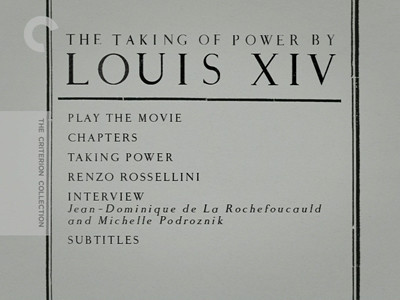
History is not always exciting. Apparently that is our lesson for today, boys and girls. In fact, it would seem that great power shifts can actually be boring. Tedious, even. With lots of standing around, enduring the rigmarole of courtly ceremony, saying what you mean without actually saying it or even by saying the opposite, and the occasional sniffing of a man's chamber pot to assess the state of his health. This is how monarchies shore up their strength and make the countries they rule great. This is how Louis XIV bolstered his power, and thus the way it happens in Robert Rossellini's 1966 anti-epic, The Taking of Power by Louis XIV.
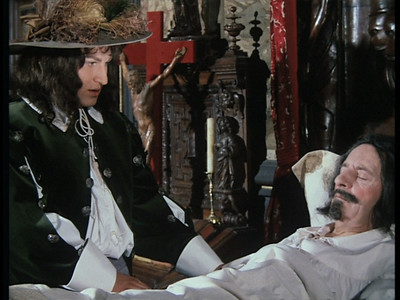
Rossellini was one of the architects of Italian Neorealism, establishing a post-War aesthetic of telling stories about real people shot in authentic situations in an attempt to remove the artifice of cinematic tradition. Films like Paisan and Germany Year Zero
The film is set in 1661, beginning on the eve of the death of Cardinal Mazarin (Silvagni), a foreign dignitary who had seized much power and wealth in France. With his passing, Louis XIV (Jean-Marie Patte) decides that it would best suit France for him to once more centralize the governance of the kingdom on a single throne. This he does despite many odds, including the doubting of his court, which sees him as merely a party boy who is easily bored. They expect him to quickly tire of government business, but before they know it, he has removed his rivals, changed fashion, and built the monumental Palace of Versailles. He also radically altered France's economy to bring prosperity to all classes, and the success of his extravagant reign would ultimately earn him the nickname “the Sun King.”
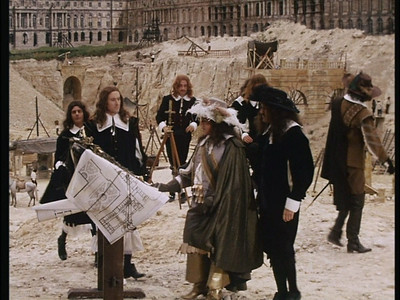
In order to recreate the 17th century, Rossellini shoots in some of the historic locations, and he adorns his actors in the fashion of the times; however, in keeping with the strictures of Neorealism, he doesn't scrub and polish everything to the point of glamorizing it. There is a shabbiness to the clothes and the overloaded wigs that in some ways plays against the opulence of the setting while also underlining it. A detailed feast near the end of the film, where Louis dines on courses that number in the teens, eating alone while the entire court watches and a private orchestra plays dinner music, spares nothing on the details, down to the garnish on the pigling and the lock used to protect the King's pork on its journey from the kitchen to his table. As if matching this ambition, Rossellini prefers long, uninterrupted takes to cut up scenes full of insert shots. Imperfections, such as Louis bumping into a stool when visiting with his mother, don't halt the scene, but are integrated into it. As filmmaking, it's both exacting and of the moment.
It's also kind of dull. Louis XIV may have secured his rule through lots of backroom plans and quiet discussion, but it doesn't exactly make for scintillating cinema. It's not at all helped by the fact that Jean-Marie Patte doesn't really exude royal bearing or the charisma of power, not even once the King has it. Though Rossellini's shooting technique may be of the moment, Patte never appears to be in that moment. Rather, through most of The Taking of Power, he looks like he is just trying to remember his lines--thought, as it turns out, it was decided he would not see script until each day's shooting and was actually reading off a blackboard, hence his often distant look. A better actor might be able to rise to that challenge, harness such struggles, and make them appear as part of the King's thought processes, but Patte looks like he's about to go catatonic from the strain. You may want to go catatonic yourself while watching it.
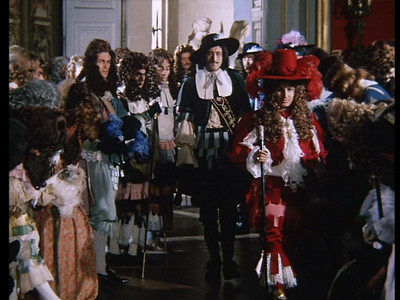
Of course, Jean-Marie Patte shouldn't be forced to carry the blame himself. The history of The Taking of Power by Louis XIV appears to be stripped of its histrionics by design. The script by Philippe Erlanger and Jean Gruault actively avoids any overwrought drama, instead contentedly searching for it in regular palace life. Some of the choices they make are smart, including using chatter amongst the court to explain certain outmoded aspects of royal etiquette to the modern audience, but the overall effect is lacking. Perhaps I have been spoiled by watching too many The West Wing
Perhaps it was Roberto Rossellini's desire to educate rather than entertain that leads to this downfall. It's all boiled vegetables and no seasoning, a dish we consume because it's good for us, because we're told we're supposed to, not because we want to. Ironically, this renders the great director's fascination with historical curiosity, after more than thirty years, to be little more than a historical curiosity itself. For me, I felt less like taking power and more like taking a nap.
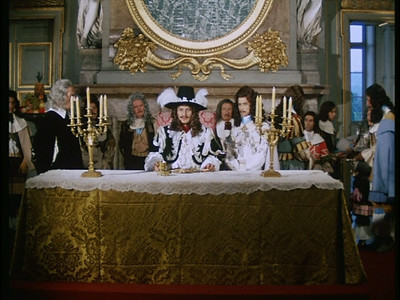
For a full rundown on the special features, read the full article at DVD Talk.

No comments:
Post a Comment